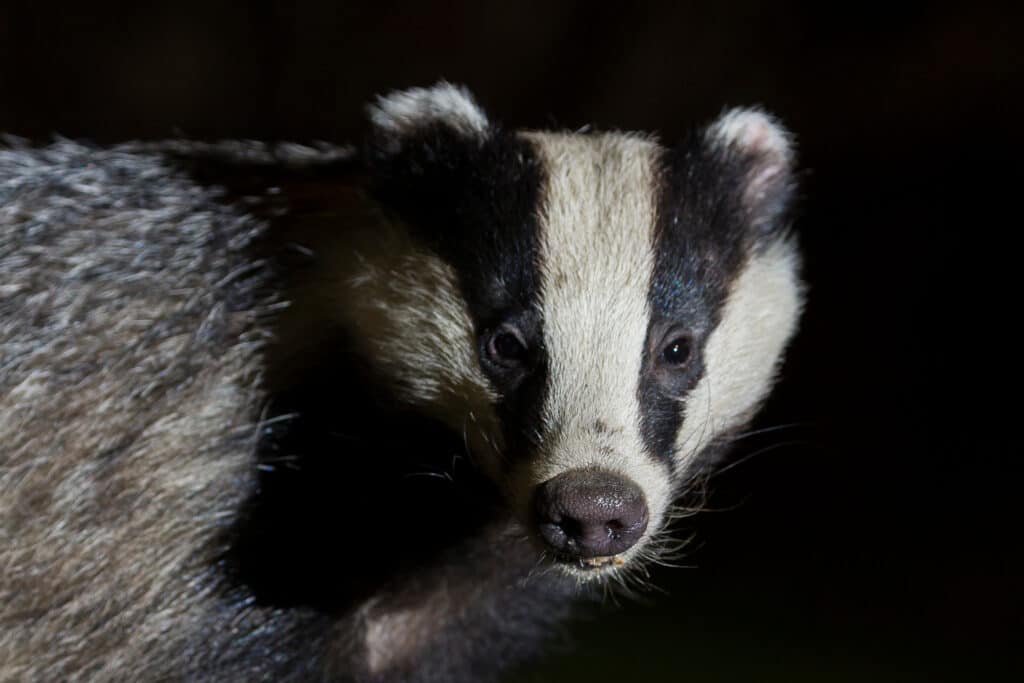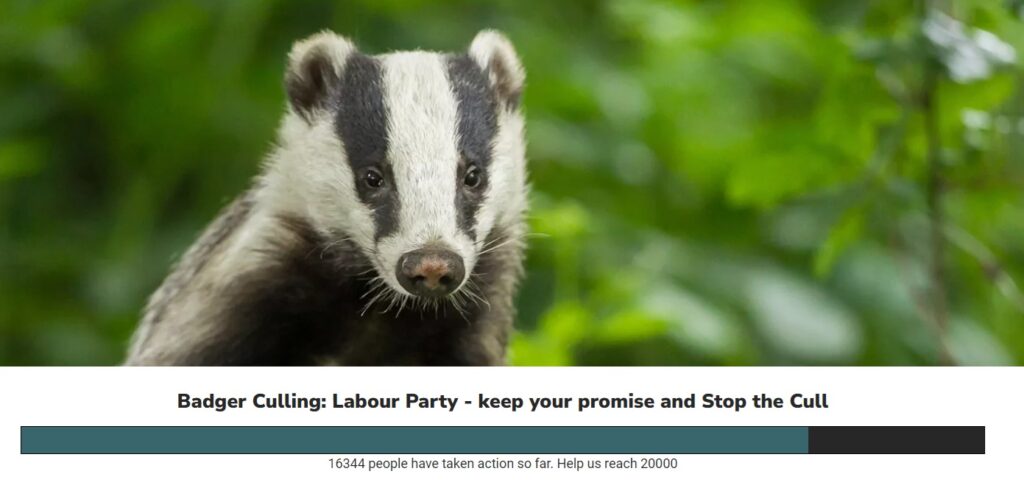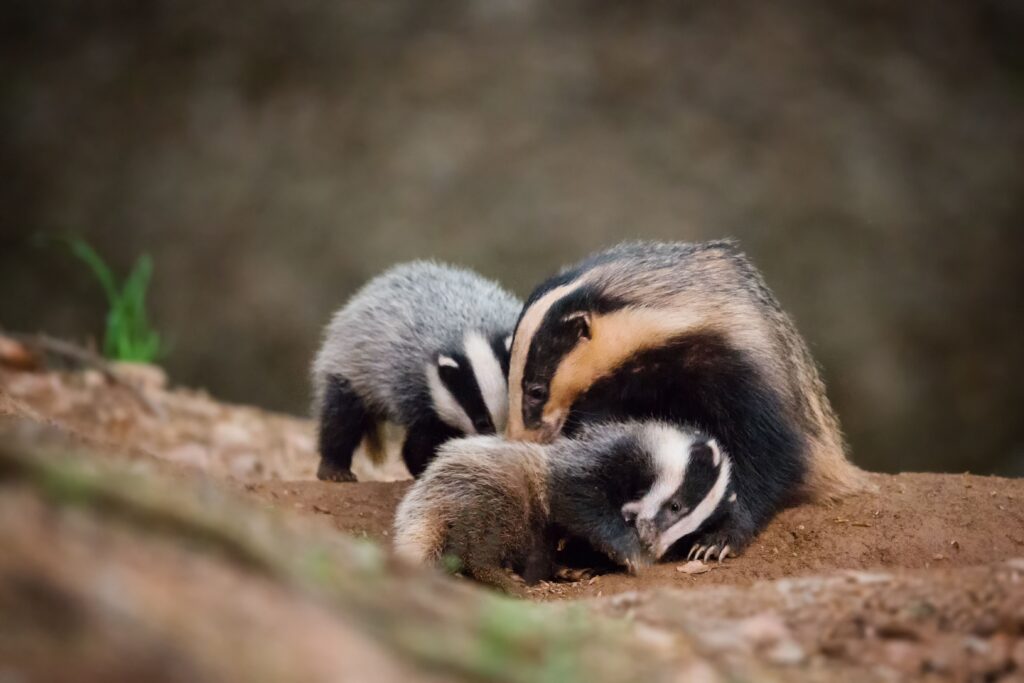Back in March, Defra (the government department working on behalf of the hunting, shooting, farming and fishing industries) launched a ‘sham consultation’, allegedly seeking input for its pre-decided plans to continue killing badgers for the dairy industry.
If the government were to go ahead with those plans, Natural England would issue licences indefinitely to kill 100% of badgers at a targeted, local level from 2026.
The consultation was widely lambasted by badger groups for the flawed science it was based on, its paucity of detail, and the lack of any option to demand a stop to culling. It was poorly (hastily) written and asked questions that couldn’t be answered because of the lack of information provided. It called for a rubber stamping that any future decisions on culling would be made behind closed doors and not subject to proper scrutiny. On top of everything else, the ridiculously short consultation period (just four weeks rather than the more usual twelve) seemed designed to put off ‘lay people’ from submitting responses, favouring instead pro-cullers who would have seen the process as a tick box exercise requiring very little thought.
From start to expected finish the entire consultation was patently unfair, especially if measured against the four Gunning Principles which state that for any consultation (1) ‘proposals are still at a formative stage’ (ie a final decision has not yet been made, or predetermined, by the decision makers), (2) ‘there is sufficient information to give ‘intelligent consideration’, (3) ‘there is adequate time for consideration and response’, or (4) ‘conscientious consideration’ must be given to the consultation responses before a decision is made‘.
None of those four principles appear to have been met by this rushed and botched consultation.
Consultation timeline
In the meantime, ecologist Tom Langton and the Badger Crowd have worked tirelessly over the last few weeks to have the consultation delayed and ruled illegal.
An interesting timeline has now emerged:
- On 28 March two solicitors’ letters were sent to the government, expressing grave concerns over aspects of the consultation and attempts to bring about what was effectively a policy u-turn on the phasing out of badger culling.
- Originally set to close on 22 April, the consultation deadline was extended to 13 May.
- On 16 May Tom Langton sent a judicial review pre-action protocol letter (PAP) to the Secretary of State. Defra was requested to confirm that no decision would be made on consultation responses before the challenge and complaints are fully heard and concluded.
- On 23 May Rishi Sunak caught the country – and his own ministers – by surprise and called a General Election for July 4th. Parliament (and therefore the government) was prorogued on 24 May and will be dissolved today (the 30th). Government actions are limited during the election campaign ‘pre-election period’ to ensure that public money is not used to support campaigning by the political party in power and to maintain the impartiality of the civil service (which includes Defra).
- On the same day the Badger Crowd wrote “This could be good news for bovine TB control and badgers if the outcome is that the [incoming] government does not let the National Farmers Union dominate and dictate its actions, as it has for so long.”
- On 29 May, Defra responded to Tom’s pre-action protocol letter, saying that they are “continuing to analyse consultation responses with a view to putting proposals for a decision on this policy to the incoming government after the election.”

Tom Langton’s response
Writing on the Badger Crowd website (see Defra scraps pre-election badger cull ambition) Tom Langton says that Defra’s response is
“…good news at least in the short term. A new policy will not be put in place by the current Conservative government. But it also implies that Defra may seek to defend the claim that the consultation was unfair, which is disappointing.
Defra also say that they want an extra two weeks to consider the PAP letter, but we will learn their position on 14th June. Defra should drop the consultation, recognise its failings and accept that badger culling has no future at all in bovine tuberculosis control in cattle.”
What might a change in government mean?
The General Election means both that it is highly likely there will be a change in government (which we welcome), but that there is now even more uncertainty about what Defra is planning to do with the country’s badgers (which we don’t welcome at all).
Tom Langton told Protect the Wild that he is optimistic about what a change in government might mean for badger culling. Labour has previously pledged to scrap badger culling after all (a promise Protect the Wild is petitioning them to keep) and according to polling are the party most likely to form the next government. Like the Lib Dems, they will, though, be looking to take back and win over seats in the southwest in areas where farming dominates the landscape and culling is widely accepted – but generally speaking badger culling is unlikely to be a major election issue even in those seats: most ‘rural’ voters will be more concerned with the cost of living/housing, NHS waiting lists, closure of local facilities, transport services, and rural crime.
Whichever party takes power they are likely to face lobbying to keep the cull in place though. Farming lobby group the National Farmers Union is determined to keep the subsidies flowing and not demand changes in eg bosecurity practices of its membership. They said a few months ago that they had been “doing everything possible to work with Labour to help them understand the importance of the controlled wildlife programme as an essential part of TB control”.
Terming the never-ending slaughter of a protected species as a “controlled wildlife programme” is typical of the language used in culling and may be persuasive to inexperienced ministers, but it’s difficult to predict how extensive or overt even the NFU’s lobbying will be. Their stated priorities are more broad, and include the impact of Brexit tariffs and the need for workers from overseas who used to come here to work on farms, so they may not be spending too much time pressuring a new government to kill badgers.
- Whatever the lobbyists might or might not be asking for, we on the pro-wildlife side need to keep the culling issue alive. An incoming government will face numerous problems, but they will have to urgently deal with Tom’s legal challenge and with a public overwhelmingly sick of seeing badgers massacred. Our message must be that a new government must be absolutely clear that they will stop ALL BADGER CULLING immediately (including rescinding any licences already issued), listen to what wildlife experts on the ground are telling them, and work with farmers to control Bovine Tb without destroying the country’s biodiversity.

-
Please sign our letter calling on an incoming Labour government to end all culling of badgers, which you can find at Badger Culling: Labour Party – keep your promise and Stop the Cull
 Protect the Wild will continue to support The Badger Crowd in its mission to bring justice for badgers.
Protect the Wild will continue to support The Badger Crowd in its mission to bring justice for badgers.


